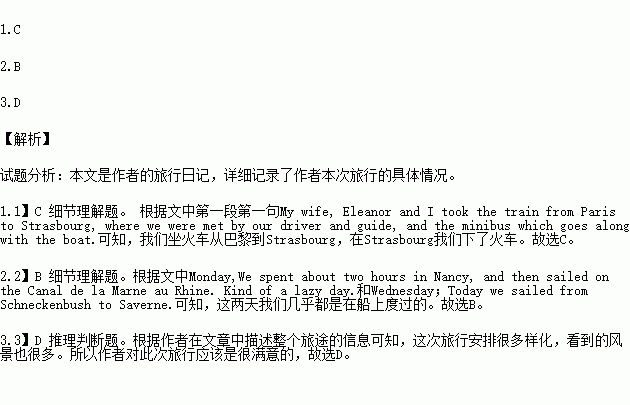题目内容
Sunday, October 5
Sunny, 66°F
My wife, Ellen, and I traveled by train from Paris to Strasbourg, where we met our driver and guide and the minibus which goes along with the boat. We stopped off in Barn for an hour on the way. Then we were taken to Nancy where the boat was kept.
After the other passengers arrived, we had our first dinner on the boat. After dinner we walked into downtown Nancy, a village with a large square and wooden houses.
Monday, October 6
Rained last night, cloudy in the morning, 69°F
We spent about two hours in Nancy, and then sailed on the Canal de la Marne au Rhine. Kind of a lazy day. Eating breakfast, lunch, and dinner, after dinner we watched a tape on Baccarat, where we will visit tomorrow.
It was pleasant to sit out on deck and watch the scenery go by at about 3 mph.
Tuesday, October 7
Light rain, 64°F
This morning we drove over to Baccarat and toured its museum and the church, which has this unbelievable lamp that is going on a world tour the next day. We did lots of shopping, and then walked across the bridge to see a very, very modern Catholic church with special Baccarat windows.
We drove to the top of the Voges Mountains and started down the eastern side. Later we drove to Sorrenbourg to see the 13th century church at the Cordeliers.
Wednesday, October 8
Cloudy, 65°F
Today we sailed from Schneckenbush to Saverne. We went through two caves, an extremely unusual part of the journey. This river scenery is very different. We were in a mountain valley with grassland on one side and a forest beginning to show some color on the other.
Thursday, October 9
Cloudy, 66°F
Our dependable minibus was waiting to load the luggage and take us to the hotel where everyone went their separate ways. Our boating days are over until next time.
1.Where did the author get off the train?
A. Paris. B. Nancy. C. Strasbourg. D. Barn.
2.On which days did the tourists spend most of their time on the boat?
A. Monday and Tuesday. B. Monday and Wednesday.
C. Wednesday and Thursday. D. Tuesday and Wednesday.
3.What does the author think of the tour?
A. Tiring. B. Expensive. C. Quick. D. Enjoyable.

